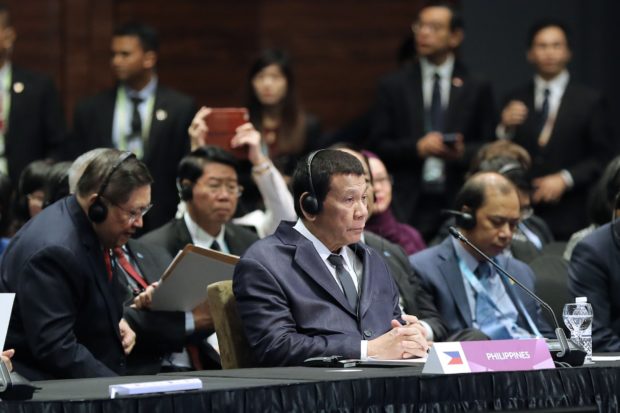
President Rodrigo Roa Duterte joins other leaders from Association of Southeast Asian Nations (ASEAN) member countries during the 3rd ASEAN-China Summit at the Suntec Convention and Exhibition Centre in Singapore on November 14, 2018. VALERIE ESCALERA/PRESIDENTIAL PHOTO
SINGAPORE — President Rodrigo Duterte on Wednesday said a code of conduct to manage multiple territorial disputes in the South China Sea was “needed at all cost.”
Speaking to reporters as he headed to the 33rd Association of Southeast Asian Nations (Asean) Summit here, the President said such a rule book was needed to govern behavior in the South China Sea to avoid miscalculations, suggesting that any risks were from potential trouble with outsiders.
“I am worried. I expressed it because we have a defense treaty [with the United States], mutual defense,” the President said.
He had threatened to abrogate the treaty because of US criticism of his brutal war on drugs but he said on Wednesday that the accord still existed.
“It’s not abrogated. It’s there,” he said.
‘Everything’s excellent’
“Everything’s been excellent between China and the rest of Asean except for the fact that there’s friction between Western nations and China,” the President said.
The region already has a nonbinding Declaration of Conduct of Parties in the South China Sea, but Asean and China are working toward a more robust agreement.
Asean and China announced agreement on a single draft of the code of conduct in August.
Speaking at the 21st Asean-China Summit on Tuesday morning, Mr. Duterte said the regional bloc and China hoped to complete the first reading of the draft by next year.
“Asean and China have seen steady progress in the initial phase of the COC (code of conduct) negotiations since the announcement of a single draft COC negotiating text, and look forward to the completion of the first reading of the [draft] by 2019,” the President said.
The Philippine leader gave assurance that Asean and China would continue to “maintain a conducive environment for future rounds of negotiations” for the code of conduct.
Perennial issue
The 10-member Asean was focusing on issues of security and trade at its summit, with managing conflict in the South China Sea a perennial issue.
China claims nearly the entire South China Sea, including waters close to the shores of its smaller neighbors Vietnam, the Philippines, Brunei and Malaysia — all members of Asean.
The UN-backed Permanent Court of Arbitration in The Hague has invalidated China’s claim in a challenge brought by the Philippines.
But China has ignored the ruling and proceeded to build artificial islands on seven Philippine-claimed reefs in the Spratly archipelago, topping the three largest reefs with military bases equipped with antiship and surface-to-air missiles.
The President, however, set aside the ruling and took steps to revive once-frosty ties with China after taking office in 2016, as he sought infrastructure funding and more trade and investment from Beijing.
Chinese Premier Li Keqiang said on Tuesday that China hoped to finish negotiations for the code of conduct in three years.
Deal in three years
On Wednesday, Li said the region had set a good example of managing the territorial disputes in the South China Sea and keeping the peace as it worked toward setting a code of conduct.
“We have found the way to properly manage and defuse differences, for example, on the issue of the South China Sea in the past years,” Li said, adding that the situation was moving toward “greater stability” with progress toward a code.
The President told Asean leaders on Tuesday night that the Philippines would work with all the parties for an early conclusion of a code of conduct.
He also reaffirmed the Philippines’ commitment to the full and effective implementation of the 2002 Declaration of Conduct of Parties in the South China Sea.
“This includes the peaceful settlement of disputes, the exercise of self-restraint, and the freedom of navigation and overflight in accordance with international law, especially the 1982 United Nations Convention on the Law of the Sea,” the President said.
He said he welcomed recent developments involving South Korea and North Korea, and called on the two countries to work toward denuclearization of the Korean Peninsula.
“We urge concerned parties to continue working toward the realization of lasting peace and stability, and reiterate our support for the complete, verifiable and irreversible denuclearization of the peninsula,” he said.
Rohingya crisis
The President also said he supported Asean’s role in providing humanitarian assistance to all communities affected by the Rohingya crisis in Myanmar’s Rakhine state.
“We must together address the root causes and create a conducive environment for affected communities to rebuild their lives,” he said.
Despite the apparent amity over territorial issues, the Rohingya crisis has overshadowed the meetings in Singapore.
The atmosphere between Myanmar’s leader, Aung San Suu Kyi, and Malaysian Prime Minister Mahathir Mohamad appeared frosty after Mahathir lambasted Suu Kyi on Tuesday for her handling of the crisis that led to mass killings and the exodus of more than 700,000 Rohingya Muslims from the Buddhist-majority Myanmar since August 2017. —With a report from AP